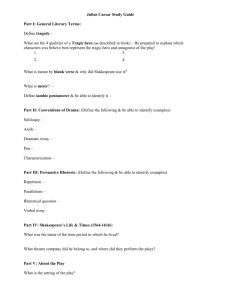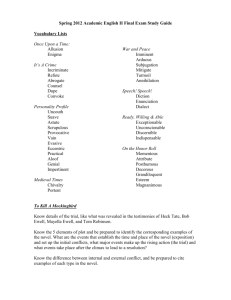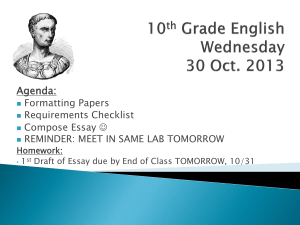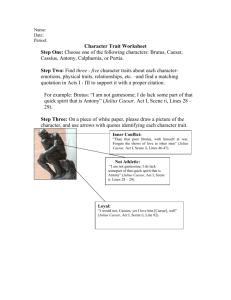9-24 Lesson - WordPress.com
advertisement
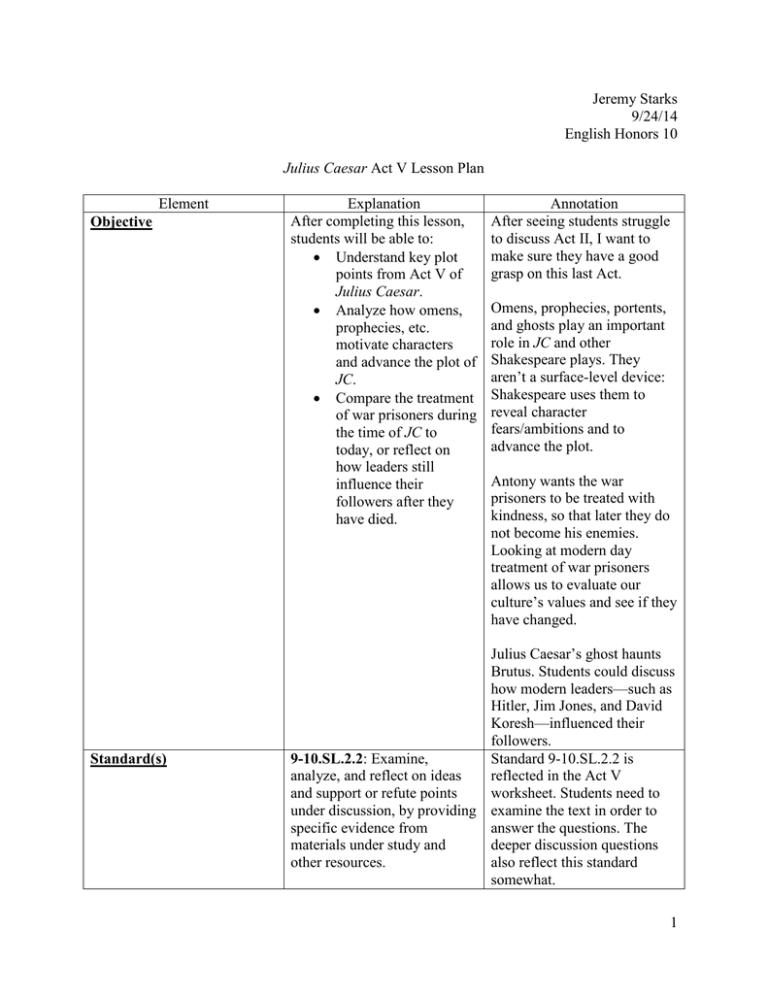
Jeremy Starks 9/24/14 English Honors 10 Julius Caesar Act V Lesson Plan Element Objective Standard(s) Explanation After completing this lesson, students will be able to: Understand key plot points from Act V of Julius Caesar. Analyze how omens, prophecies, etc. motivate characters and advance the plot of JC. Compare the treatment of war prisoners during the time of JC to today, or reflect on how leaders still influence their followers after they have died. Annotation After seeing students struggle to discuss Act II, I want to make sure they have a good grasp on this last Act. Omens, prophecies, portents, and ghosts play an important role in JC and other Shakespeare plays. They aren’t a surface-level device: Shakespeare uses them to reveal character fears/ambitions and to advance the plot. Antony wants the war prisoners to be treated with kindness, so that later they do not become his enemies. Looking at modern day treatment of war prisoners allows us to evaluate our culture’s values and see if they have changed. Julius Caesar’s ghost haunts Brutus. Students could discuss how modern leaders—such as Hitler, Jim Jones, and David Koresh—influenced their followers. 9-10.SL.2.2: Examine, Standard 9-10.SL.2.2 is analyze, and reflect on ideas reflected in the Act V and support or refute points worksheet. Students need to under discussion, by providing examine the text in order to specific evidence from answer the questions. The materials under study and deeper discussion questions other resources. also reflect this standard somewhat. 1 Introduction Activities 9-10.RL.2.3: Analyze how dynamic characters develop over the course of a text, interact with other characters, and advance the plot or develop the theme. Bell-ringer: Tell me, in your own words, what a tragedy is. What are the recurring elements of tragedies? How are they different from comedies? Can you list a few plays, books, or movies that are considered tragedies? 1. Begin with the bellringer and collect when the students are done. (5 minutes) 2. Hand out worksheet for students to work on in small groups. Assign different scenes to different groups. (10 minutes) 3. Come back as a class and go over the answers. (7 minutes) 4. Assign the “Omens” question to the groups, found on page 634 of the textbook. (20 minutes) 5. Ask for two separate groups to offer one of the omens they found (5 minutes) 6. Pose one of the deeper discussion questions to the class at large. 7. Type up responses to “Omens” worksheet in Write To Learn for homework. Standard 9-10.RL.2.3 is reflected in the “Omens” worksheet; students get to see how these supernatural events affect characters and the plot. I want to gauge for myself where students are at with their understanding of tragedies. At the very least I am asking them to call on prior knowledge, as well as get into the mindset of English class. The worksheet (Step #2) is meant to show me how closely students can read and understand Act V. To answer the questions, they’ll need to take Shakespeare’s language and paraphrase it in order to get to the answer. I am assigning them different scenes to work on so we can move through the worksheet faster. It’s a simple question of understanding; later in this lesson and on 9/26 we’ll be working at higher levels of Bloom’s Taxonomy. We will go over the answers as a class (Step #3), and students will be able to fill in the answers for other scenes based on what other groups say. I will collect this worksheet, but the students will get it back on Friday to use for studying. I have divided the “Omens” question (Step #4) into a table so that it is easier for the students to answer. Hopefully students will pick different 2 omens, portents, etc. For Step #5, I will type up each of the group’s responses into a blank copy of the worksheet. Evaluation Conclusion I will collect the bell-ringer and see what students have written. As stated above, I want to see where the students are at with understanding the literary term “tragedy,” and see if they use As students work on the Act V other literary terms to define worksheet and the “Omens” it, such as tragic hero and worksheet, I will be walking tragic flaw. around to check for understanding and help Students will be working in students where appropriate. I groups, making it easier to will be collecting both of these check for understanding. worksheets. They will be getting these worksheets back to use as study guides for the JC test. Step #6 will serve as the The deeper questions are conclusion to the lesson. The meant to get the students to two “Deeper Discussion think about modern Questions” are listed at the equivalents of things found in end of this document. the play. Comparing and reflecting could help them remember items for the test, or what they talk about could be used in an essay prompt. Discussion Questions, Lines of Text, and Answers: 5.1 Questions: 1. What exchange between Antony and Octavius shows us a bit of a split between them? (lines 16-20) Antony tells Octavius to lead his soldiers out on to the left hand of the field, and Octavius says he will go right and Antony should take the left. Antony asks Octavius why he crosses (goes against) him and Octavius says he is not crossing Antony but will do so. 2. What does Antony accuse the conspirators of (aside from the obvious, murder) during their parley? (lines 30-44) 3 Antony accuses the conspirators of being flatterers who pretended to be loyal to Caesar and then betrayed him. 3. According to Antony, from where and how did Casca stab Caesar? (lines 43-44) Casca struck Caesar in the neck, while standing behind Caesar. 5.3 Questions: 1. What did Cassius do to a flag bearer in his own army when he tried to retreat? (lines 1-4) He killed him and took his flag up, charging into battle with it. 2. How does Pindarus misinterpret what he is seeing; what does he think is happening to Titinius? (lines 28-35) Pindarus is actually seeing Titinius being surrounded by their own soldiers, who are taking him down off his horse and are shouting for joy because they are winning. Pindarus believes the soldiers surrounding Titinius are enemy soldiers who have captured him and are shouting with joy at having captured one of the enemy. 3. What literary device or devices is Messala using on lines 5.67-71? Personification. Messala gives human qualities to the inanimate idea of “error.” Other answers: apostrophe and metaphor. 5.4 Questions: 1. Right after Cato the younger, son of Marcus Cato, identifies himself, whom does Lucilius falsely claim to be in an effort to fool the enemy? (lines 7-8) Lucilius claims to be Brutus. 2. How does Antony order his men to treat Lucilius? (lines 26-29) Antony orders that their prisoner will be treated with all kindness and kept safe; he would rather have such men as friends than enemies. 3. What does Brutus say about Julius Caesar in Scene 5? Brutus tells Volumnius that the ghost of Caesar has appeared to him twice. 5.5 Questions: 1. Why does Brutus want one of his friends to kill him? (lines 23-25) Brutus says that they are at the edge of a pit and are surrounded by their enemies; he considers it more noble to jump and take control, having a friend end his life, rather than suffer the 4 indignity of being pushed into the pit by the enemy and be killed by one of them. He does not want to give them the satisfaction of being able to kill him. He wants to die on his own terms, in control to the last. Also, he does not want to be captured and taken prisoner, because this would be too humiliating. He also cannot commit suicide because he also sees this as cowardly and this violates the principles of the philosophy of Stoicism, of which he is a follower. 2. What does Brutus mean when he says, just before he dies, “Caesar, now be still; I kill’d not thee with half so good a will”? (lines 50-51) Brutus means that he was more willing to kill himself than he was willing to kill Caesar. He was only half as willing to kill his friend Caesar as he was willing to kill himself. 3. What offer does Octavius make to all those who followed Brutus? (lines 60-61) Octavius offers to take on all those who followed Brutus as his own employees. They can now serve under Octavius. They won’t be taken prisoner or killed. Throughout the play, omens, portents, prophecies, and ghosts appear. Choose two events and explain how they are interpreted by the characters in the play. What do these interpretations reveal about the motives, ambitions or fears of the characters? How does Shakespeare use these events to further the action of the play? Deeper Discussion Questions: Look back at how Caesar’s ghost affects Brutus. Consider world history and current events. Have there been, or are there still, leaders who continue to cause harm even after they are dead, due to their loyal followers? Answers will vary. Look back at the way Antony orders his men to treat Lucilius. How are prisoners of war or enemy combatants treated today? Are they treated with as much kindness and civility? If they are, what do you think that means? If they aren’t, what do you think that means? Answers will vary. 5



